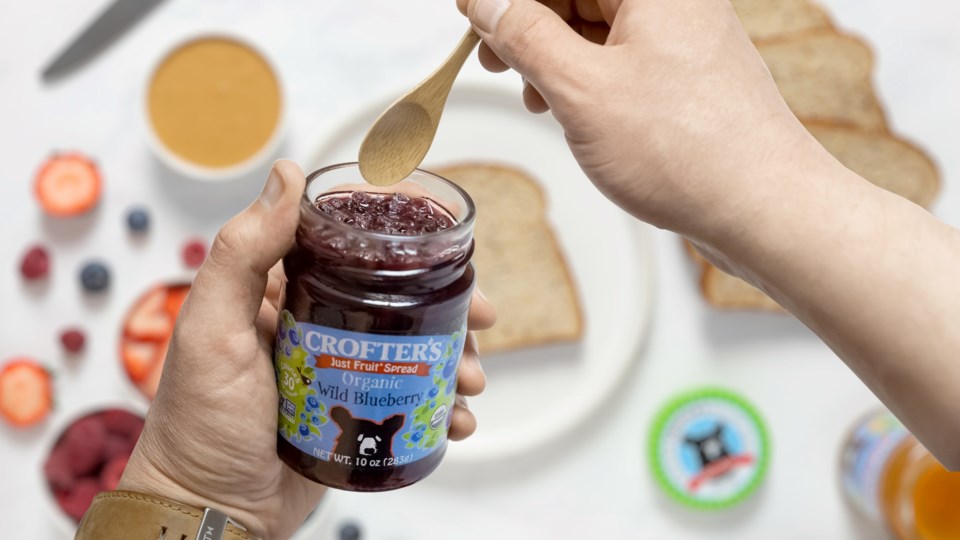Gerhard Latka attributes his longevity in the food processing business to his stamina and faith in creating new markets where none existed before.
Though his Parry Sound-based company occupies only a small slice of the conventional food industry, Crofter’s Foods is considered a big-time North American player in the burgeoning organics market.
Latka has been in his industry for 15 years. Last year, the certified organic manufacturer of jams, fruit spreads and conserves generated sales of $7.1 million, a considerable step up from the $55,000 the company posted its first year in 1989.
They ship product directly to major North American supermarket chains and health food retailers, and do some private labelling for others. Smaller volumes are exported to Singapore, Taiwan, Japan, New Zealand and Australia.
And though the 22-employee company sold its successful juice line to Clement Pappas — the second-largest juice manufacturer in the United States — in April 2003, it represented only a temporary dip in annual sales, from $8 million to $4 million. Less than 18 months later, they are back up over $7 million, demonstrating the blue-sky potential of the organic food industry.
“That’s the kind of growth we can achieve,” says Latka.
The sale of the juice line enabled them to reinvest $2 million back into the plant. In following up what has turned out to be an ongoing three-year expansion, Crofter’s is set to build again this spring with a new 8,400-square-foot warehouse and freezer.
“I have no doubt within three to four years we’ll be up to $13 million.”
A native of Nordlinger, Germany, the self-proclaimed “proud Bavarian” grew up and was trained in his father’s flavour house, a company which injects essential oils and extracts into beverages, candy and other food products.
He emigrated to Canada and Parry Sound in 1989. He took over a 4,200-square-foot downtown building, then used as a public laundromat, and converted it into a food processing plant producing jams and juices using certified organic fruit.
Once it got rolling, Latka admits Crofter’s was probably five to 10 years ahead of its time. During the 1980s and '90s, nobody paid much attention to eating healthily or questioned much about what went into their food.
“It was sort of trendy, but it wasn’t enough for any of the (retail) big boys to look at seriously. We always knew we were doing the right thing. We were just early with organics.”
By 2000, the major supermarket chains started getting serious. Following Europe’s and Japan’s lead, the U.S. government produced a National Organic Program (NOP) and adopted the independent auditors’ rules and regulations dictating what true organics were. It added legitimacy to the industry and to Crofter’s.
Latka says Crofter’s has closely scrutinized its own methods and material almost from day one, installing a gas chromatograph machine in 1991.
“We started to check our incoming raw ingredients on the 60 most commonly used herbicides and pesticides,” says Latka. “We took it seriously.”
When the U.S. federal regulations came into play, “it helped us out big time.”
Independent inspectors regularly visit their 10,000-square-foot plant to verify their ingredients and ensure their processing methods conform to organic standards. Independent auditors visit their plant once, and sometimes twice, a year.
Four employees are solely devoted to quality assurance in their in-house lab.
Lab manager John Warner built Crofter’s in-house quality assurance program. Latka extends a great deal of credit for their control methods to him.
“He’s a very integral part of the company,” says Latka. “He was very methodical in building the program.”
Certified by Quality Assurance International and HACCP (Hazard Analysis and Critical Control Point), Crofter’s takes their place in the consumer food chain very seriously.
“As a processor, we’re really the buffer between the shelf space where the consumer picks up the jam and the supply end which is selling us the sweetener and fruit,” says Latka. He sources the bulk of the 500 to 600 tonnes of raspberries, strawberries, blueberries and other soft fruit they process annually from Europe and to a lesser extent from Québec, the American West Coast and Chile.
According to his specifications, Latka says the farm cooperative packing houses in Poland, Serbia and Bosnia will sort, wash, freeze, grade and pack organically grown fruit and ship it by sea freight container to Canada.
“Sea freight from Europe is cheaper than running it by truck from California,” says Latka, who wouldn’t mind purchasing more Canadian-grown crops if the packing infrastructure were here.
“There’s definitely a necessity for a central or co-operative packing house. That’s what’s missing in our area.”
The organic food market has expanded by 20 per cent annually for seven years.




